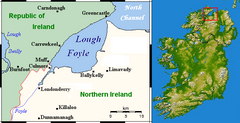Lough Foyle
| Lough Foyle/Loch Foyle Loch Feabhail |
|
|---|---|

Lough Foyle View From CarrickHugh Picnic Site
|
|
 |
|
| Location | Republic of Ireland – United Kingdom border |
| Coordinates | 55°07′00″N 7°05′00″W / 55.116667°N 7.083333°WCoordinates: 55°07′00″N 7°05′00″W / 55.116667°N 7.083333°W |
| River sources | River Foyle, River Roe, River Faughan |
| Ocean/sea sources | Atlantic Ocean, Irish Sea |
| Basin countries |
Northern Ireland, Republic of Ireland |
| Settlements | Ballykelly, Derry, Greencastle, Magilligan, Moville, Muff |
| Designated | 2 February 1999 |
Lough Foyle, sometimes Loch Foyle (Irish: Loch Feabhail, meaning "Feabhal's loch" or "loch of the lip"), is the estuary of the River Foyle, on the north coast of Ireland. It lies between County Londonderry in Northern Ireland and County Donegal in the Republic of Ireland. Sovereignty over these waters has been in dispute since the Partition of Ireland.
The Lough Foyle Ramsar site (wetlands of international importance designated under the Ramsar Convention), is 2204.36 hectares in area, at latitude 55 05 24 N and longitude 07 01 37 W. It was designated a Ramsar site on 2 February 1999. The site consists of a large shallow sea lough which includes the estuaries of the rivers Foyle, Faughan and Roe. It contains extensive intertidal areas of mudflats and sandflats, salt marsh and associated brackish ditches. The site qualified under Criterion 1 of the Ramsar Convention because it is a particularly good representative example of a wetland complex which plays a substantial hydrological, biological and ecological system role in the natural functioning of a major river basin located in a trans-border position. It also qualified under Ramsar criterion 2 as it supports an appreciable number of rare, vulnerable or endangered species of plant and animal. A range of notable fish species have been recorded for the Lough Foyle estuary and the lower reaches of some of its tributary rivers. These include allis shad, twait shad, smelt and sea lamprey, all of which are Irish Red Data Book species. Important populations of Atlantic salmon migrate through the system to and from their spawning grounds.
...
Wikipedia
